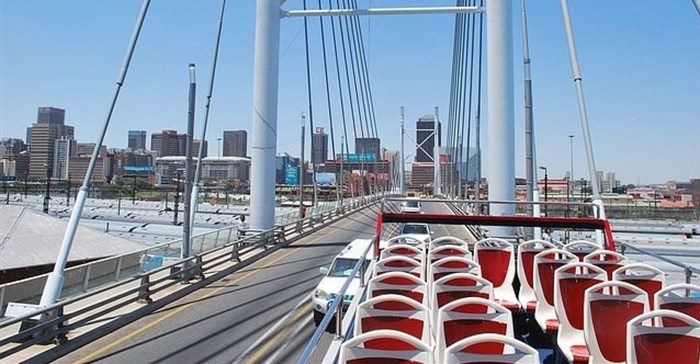
Related
Top stories





Energy & MiningGlencore's Astron Energy gears up with new tanker amidst Sars dispute
Wendell Roelf 10 hours

More news



















Logistics & Transport
Uganda plans new rail link to Tanzania for mineral export boost









Johannesburg is made up of many multinational offices in the financial service sector - including Barclays Bank and First National Bank - which has become the main industry of employment, and capital gain in the city.
Tourism as a pillar of economic strength
Johannesburg’s destination marketing organisation, Joburg Tourism wishes to present the city not only as a stay-over-for-a night or business and event tourism destination but also as one for travel. Tourism is considered a priority for the city of Johannesburg and a support system for its economic growth strategy. The organisation highlights the city not only as a destination but as a place where one can obtain experiences of art, neighbourhoods and shopping.
Regional visitors represent the majority of visitors for Johannesburg with 90%, while only 10% of international visitors are from outside the region. It is estimated that 80% of tourists that visit the Gauteng province, go to Johannesburg.
Johannesburg has become one of the largest tourist destinations in South Africa and has attracted half a million business tourists in 2016.
The findings indicate that the majority of domestic travellers between Johannesburg and Cape Town travel for a day's meeting or work trip, and travel back again in the late afternoon. This has boded well for local airlines, but badly for those who wish to tap into the “bleisure” (mixing business with leisure) trend.
An average of 14% of visitor spend in Johannesburg goes to accommodation, indicating that the majority of visitors have a small budget allocated to this and would rather choose a more affordable option.
Johannesburg hotels derive the majority of their business from international business travellers and meetings, incentives, conferences and events (MICE). Foreign business travellers most often stay in luxury hotels based in Sandton. Sustainability in hotels is restricted to larger brands, which have large chains across the country and can negotiate favourable deals with agents e.g. Tsogo Sun and the Marriott group.
The Johannesburg Development Agency has admitted to being behind on its road restoration schedule due to funding shortages and the loss of skilled workers. It has, however, come up with a five-year back log strategy aimed at improving road conditions from potholes to engineering smarter road platforms.
Smart traffic management strategies have, however, ensured that the city wins the 2017 Tom-Tom Traffic Index Award for the best traffic management internationally with the help of the Gautrain and integrated bus systems which have led to a decrease in traffic congestion.
Johannesburg’s Smart Access Programme is aimed to give free Wi-Fi to all in the city by 2020. 300MB of free Wi-Fi per day is available at Bus Rapid Transport stations and at theatres. Johannesburg is tapping into the essential internet availability required, especially for millennials, on every leg of their journey. Millennials want to share their experiences online and post on social media, map out areas of interest, and be in continuous communication with the world.